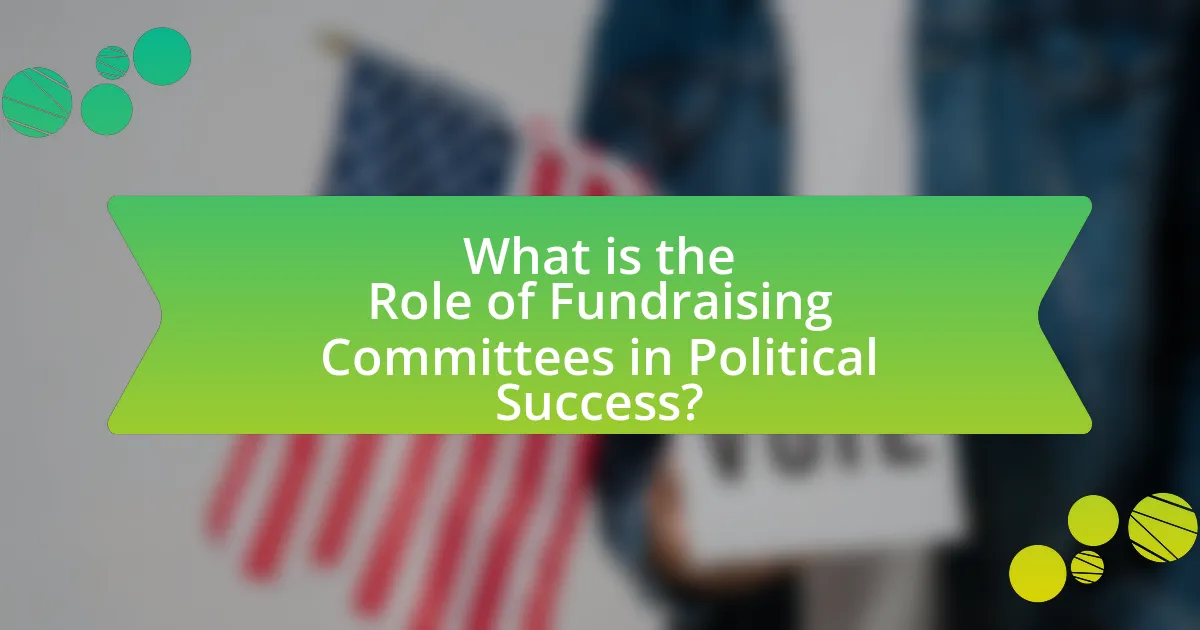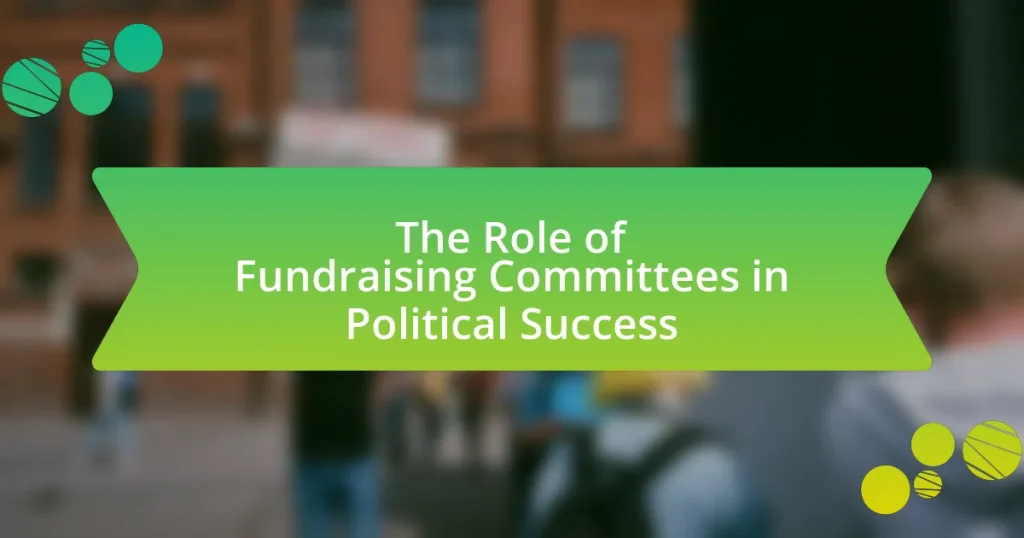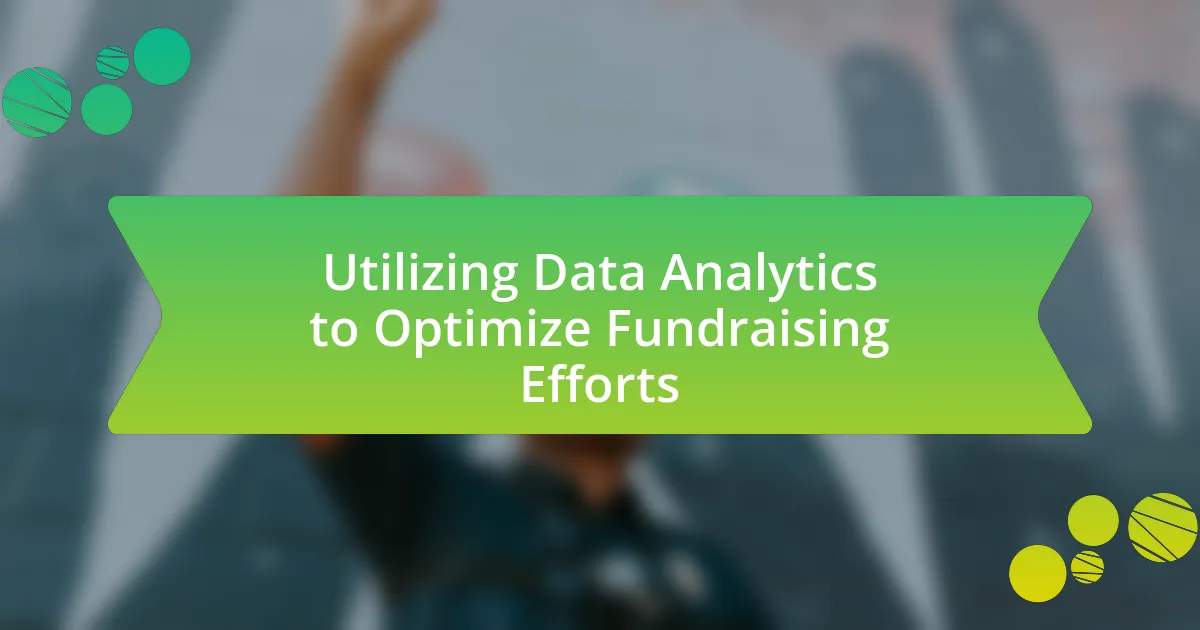Fundraising committees are essential entities in the political landscape, significantly influencing candidates’ success by mobilizing financial resources for campaign activities. These committees organize fundraising events, solicit donations, and manage contributions, directly impacting a candidate’s visibility and outreach efforts. The article explores the key functions of fundraising committees, their influence on electoral outcomes, the challenges they face, and the strategies they can employ for success. Additionally, it highlights the importance of technology and data analytics in modern fundraising efforts, as well as future trends that may shape the role of these committees in political campaigns.

What is the Role of Fundraising Committees in Political Success?
Fundraising committees play a crucial role in political success by mobilizing financial resources necessary for campaign activities. These committees are responsible for organizing fundraising events, soliciting donations, and managing contributions, which directly impact a candidate’s ability to reach voters through advertising, outreach, and campaign infrastructure. For instance, according to the Center for Responsive Politics, candidates who raise more money tend to have higher chances of winning elections, as financial backing allows for more extensive campaign strategies and voter engagement efforts. Thus, effective fundraising committees are essential for enhancing a candidate’s visibility and competitiveness in the political arena.
How do fundraising committees influence political campaigns?
Fundraising committees significantly influence political campaigns by providing essential financial resources that enable candidates to promote their messages and reach voters. These committees raise funds through donations, which are crucial for campaign activities such as advertising, organizing events, and mobilizing volunteers. For instance, according to the Federal Election Commission, candidates who effectively utilize fundraising committees can raise millions of dollars, allowing them to outspend opponents and increase their visibility in competitive races. This financial advantage often translates into higher voter engagement and support, demonstrating the critical role that fundraising committees play in shaping electoral outcomes.
What are the key functions of fundraising committees in elections?
Fundraising committees in elections primarily function to raise financial support for candidates and political campaigns. These committees organize fundraising events, solicit donations from individuals and organizations, and manage campaign finances to ensure compliance with legal regulations. For instance, according to the Federal Election Commission, effective fundraising committees can significantly impact a candidate’s ability to compete, as campaigns with higher funding often have more resources for advertising, outreach, and mobilization efforts. Additionally, fundraising committees help build a network of supporters, which can enhance a candidate’s visibility and credibility in the electoral process.
How do fundraising committees impact candidate visibility and outreach?
Fundraising committees significantly enhance candidate visibility and outreach by mobilizing financial resources and expanding networks. These committees enable candidates to finance advertising campaigns, host events, and engage in grassroots mobilization, which are essential for reaching a broader audience. For instance, a study by the Center for Responsive Politics found that candidates with robust fundraising committees often outspend their opponents, leading to increased media coverage and public awareness. Additionally, fundraising committees connect candidates with influential donors and community leaders, further amplifying their outreach efforts. This strategic financial backing and networking capability directly correlate with improved electoral performance, as evidenced by numerous election cycles where well-funded candidates have outperformed their less-funded counterparts.
Why are fundraising committees essential for political candidates?
Fundraising committees are essential for political candidates because they enable the collection of financial resources necessary for campaign activities. These committees organize fundraising events, manage donor relationships, and ensure compliance with campaign finance laws, which are critical for maintaining transparency and legality in fundraising efforts. According to the Federal Election Commission, candidates who effectively utilize fundraising committees can significantly increase their campaign budgets, allowing for more extensive outreach and advertising, which directly correlates with electoral success. For instance, in the 2020 U.S. presidential election, candidates who raised substantial funds through their committees were able to dominate media presence and voter engagement, illustrating the direct impact of fundraising on political viability.
What advantages do candidates gain from having a fundraising committee?
Candidates gain several advantages from having a fundraising committee, primarily increased financial support and enhanced networking opportunities. Fundraising committees enable candidates to tap into a broader donor base, which can significantly boost their campaign resources. For instance, a study by the Center for Responsive Politics found that candidates with organized fundraising committees typically raise 30% more funds than those without. Additionally, these committees facilitate connections with influential donors and political allies, which can lead to strategic endorsements and increased visibility. This combination of financial backing and networking is crucial for a candidate’s success in competitive political environments.
How do fundraising committees help in building a candidate’s network?
Fundraising committees help in building a candidate’s network by connecting the candidate with influential donors and supporters. These committees organize events and outreach efforts that facilitate interactions between the candidate and potential allies, expanding the candidate’s reach within political and social circles. For example, a study by the National Institute for Money in Politics found that candidates with active fundraising committees are more likely to receive contributions from high-profile individuals, which enhances their visibility and credibility in the political arena. This strategic networking is essential for gaining endorsements and building coalitions that can support the candidate’s campaign.
What challenges do fundraising committees face in political campaigns?
Fundraising committees in political campaigns face several significant challenges, including regulatory compliance, donor engagement, and competition for funds. Regulatory compliance is crucial as committees must navigate complex campaign finance laws, which can vary by state and federal levels, impacting how funds are raised and reported. For instance, the Federal Election Commission (FEC) enforces strict limits on contributions, requiring committees to maintain accurate records and file timely reports, which can be resource-intensive.
Donor engagement presents another challenge, as committees must cultivate relationships with potential donors while addressing their concerns and motivations for contributing. This requires effective communication strategies and outreach efforts to build trust and encourage financial support. Additionally, fundraising committees often compete with numerous other campaigns and organizations for limited donor resources, making it essential to differentiate their message and appeal to potential supporters effectively.
These challenges are compounded by the increasing reliance on digital fundraising platforms, which necessitate a strong online presence and the ability to adapt to rapidly changing technology and donor preferences.
How do legal regulations affect fundraising committee operations?
Legal regulations significantly impact fundraising committee operations by establishing rules for campaign finance, contribution limits, and transparency requirements. These regulations dictate how much money can be raised and spent, influencing the strategies committees employ to engage donors. For instance, the Federal Election Commission (FEC) enforces limits on individual contributions to candidates, which directly affects the fundraising targets and methods committees use. Additionally, regulations often require committees to disclose their financial activities, promoting accountability and transparency, which can enhance public trust and influence donor behavior.
What are common pitfalls that fundraising committees encounter?
Common pitfalls that fundraising committees encounter include lack of clear goals, inadequate communication, and failure to engage donors effectively. Fundraising committees often struggle to define specific, measurable objectives, which can lead to unfocused efforts and wasted resources. Additionally, poor communication within the committee and with potential donors can result in misunderstandings and missed opportunities. Research indicates that organizations with strong donor engagement strategies see a 50% increase in contributions, highlighting the importance of effectively connecting with supporters.
How do fundraising committees adapt to changing political landscapes?
Fundraising committees adapt to changing political landscapes by analyzing voter sentiment and adjusting their strategies accordingly. For instance, they may shift their focus to emerging issues that resonate with constituents, such as climate change or healthcare reform, based on polling data. Additionally, committees often diversify their fundraising methods, incorporating digital platforms and social media to reach younger voters who are increasingly influential in elections. This adaptability is evidenced by the significant increase in online donations during the 2020 U.S. presidential election, where campaigns that effectively utilized digital outreach saw a marked increase in contributions.
What strategies can fundraising committees employ for success?
Fundraising committees can employ targeted strategies such as building strong donor relationships, utilizing data analytics for donor segmentation, and implementing effective communication plans. Building strong donor relationships fosters trust and encourages repeat contributions, which is essential for sustained fundraising success. Utilizing data analytics allows committees to segment donors based on their giving history and preferences, enabling personalized outreach that increases engagement and donations. Effective communication plans, including clear messaging and regular updates, keep donors informed and connected to the cause, enhancing their commitment. These strategies are supported by research indicating that organizations with strong donor relationships see a 50% increase in repeat donations, highlighting the importance of relationship management in fundraising success.
How can fundraising committees effectively engage donors?
Fundraising committees can effectively engage donors by establishing personalized communication strategies that resonate with individual donor interests and values. Tailoring outreach efforts, such as personalized emails, phone calls, or face-to-face meetings, fosters a sense of connection and importance among donors. Research indicates that personalized communication increases donor retention rates by up to 50%, demonstrating its effectiveness in building lasting relationships. Additionally, providing regular updates on the impact of donations and involving donors in decision-making processes enhances their engagement and commitment to the cause.
What role does technology play in modern fundraising efforts?
Technology plays a crucial role in modern fundraising efforts by enhancing communication, streamlining donation processes, and expanding outreach capabilities. Digital platforms enable organizations to connect with a broader audience through social media, email campaigns, and crowdfunding websites, significantly increasing donor engagement. For instance, according to a report by the Pew Research Center, 54% of online donors prefer to give through digital channels, highlighting the shift towards technology-driven fundraising. Additionally, tools like data analytics allow organizations to target potential donors more effectively, optimizing fundraising strategies and improving overall success rates.
What best practices should fundraising committees follow for optimal impact?
Fundraising committees should establish clear goals and strategies to maximize their impact. Setting specific, measurable objectives allows committees to focus their efforts effectively and track progress. For instance, committees can analyze past fundraising data to identify successful tactics and target demographics, ensuring that resources are allocated efficiently. Additionally, engaging with donors through personalized communication fosters relationships and encourages repeat contributions. Research indicates that organizations with strong donor engagement strategies see a 20% increase in donations compared to those without. Furthermore, diversifying fundraising methods, such as events, online campaigns, and direct mail, can broaden reach and enhance revenue streams. By implementing these best practices, fundraising committees can significantly improve their effectiveness and contribute to political success.
How can fundraising committees measure their success?
Fundraising committees can measure their success through key performance indicators (KPIs) such as total funds raised, donor retention rates, and the number of new donors acquired. Total funds raised provides a direct measure of financial success, while donor retention rates indicate the effectiveness of relationship-building efforts, with studies showing that retaining existing donors is often more cost-effective than acquiring new ones. Additionally, tracking the number of new donors acquired helps assess outreach effectiveness and the committee’s ability to expand its supporter base. These metrics collectively offer a comprehensive view of a fundraising committee’s performance and impact on political success.
What are the key elements of a successful fundraising strategy?
A successful fundraising strategy includes clear goals, a targeted audience, effective messaging, diverse fundraising methods, and strong relationship management. Clear goals provide direction and measurable outcomes, while identifying a targeted audience ensures that efforts are focused on potential donors who are likely to contribute. Effective messaging communicates the mission and impact of the cause, making it compelling for donors. Utilizing diverse fundraising methods, such as events, online campaigns, and major gifts, maximizes revenue potential. Finally, strong relationship management fosters ongoing engagement with donors, leading to sustained support. Research indicates that organizations with structured fundraising strategies raise 30% more than those without.
What are the future trends for fundraising committees in political success?
Future trends for fundraising committees in political success include increased reliance on digital platforms, enhanced data analytics for targeting donors, and a focus on grassroots fundraising efforts. Digital platforms enable committees to reach a broader audience quickly, as evidenced by the significant rise in online donations during recent election cycles, where online contributions accounted for over 30% of total campaign funds in the 2020 U.S. elections. Enhanced data analytics allow committees to identify and engage potential donors more effectively, leading to more personalized outreach strategies. Additionally, grassroots fundraising is gaining traction, as candidates increasingly seek small-dollar donations from a larger number of supporters, reflecting a shift towards community-driven funding models that can foster greater voter engagement and loyalty.






